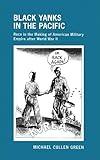Black Yanks in the Pacific : Race in the Making of American Military Empire after World War II / Michael Cullen Green.
Material type: TextSeries: The United States in the WorldPublisher: Ithaca, NY : Cornell University Press, [2011]Copyright date: ©2011Description: 1 online resource (224 p.) : 18 halftonesContent type:
TextSeries: The United States in the WorldPublisher: Ithaca, NY : Cornell University Press, [2011]Copyright date: ©2011Description: 1 online resource (224 p.) : 18 halftonesContent type: - 9780801462214
- 940.5403
- E185.63
- online - DeGruyter
| Item type | Current library | Call number | URL | Status | Notes | Barcode | |
|---|---|---|---|---|---|---|---|
 eBook
eBook
|
Biblioteca "Angelicum" Pont. Univ. S.Tommaso d'Aquino Nuvola online | online - DeGruyter (Browse shelf(Opens below)) | Online access | Not for loan (Accesso limitato) | Accesso per gli utenti autorizzati / Access for authorized users | (dgr)9780801462214 |
Browsing Biblioteca "Angelicum" Pont. Univ. S.Tommaso d'Aquino shelves, Shelving location: Nuvola online Close shelf browser (Hides shelf browser)
Frontmatter -- Contents -- Acknowledgments -- Introduction. Everyday Racial Politics in a Military Empire -- Chapter 1. Reconversion Blues and the Appeal of (Re)Enlistment -- Chapter 2. The American Dream in a Prostrate Japan -- Chapter 3. The Public Politics of Intimate Affairs -- Chapter 4. A Brown Baby Crisis -- Chapter 5. The Race of Combat in Korea -- Epilogue. Military Desegregation in a Militarized World -- Notes -- Selected Bibliography -- Index
restricted access online access with authorization star
http://purl.org/coar/access_right/c_16ec
By the end of World War II, many black citizens viewed service in the segregated American armed forces with distaste if not disgust. Meanwhile, domestic racism and Jim Crow, ongoing Asian struggles against European colonialism, and prewar calls for Afro-Asian solidarity had generated considerable black ambivalence toward American military expansion in the Pacific, in particular the impending occupation of Japan. However, over the following decade black military service enabled tens of thousands of African Americans to interact daily with Asian peoples—encounters on a scale impossible prior to 1945. It also encouraged African Americans to share many of the same racialized attitudes toward Asian peoples held by their white counterparts and to identify with their government's foreign policy objectives in Asia.In Black Yanks in the Pacific, Michael Cullen Green tells the story of African American engagement with military service in occupied Japan, war-torn South Korea, and an emerging empire of bases anchored in those two nations. After World War II, African Americans largely embraced the socioeconomic opportunities afforded by service overseas—despite the maintenance of military segregation into the early 1950s—while strained Afro-Asian social relations in Japan and South Korea encouraged a sense of insurmountable difference from Asian peoples. By the time the Supreme Court declared de jure segregation unconstitutional in its landmark 1954 Brown v. Board of Education decision, African American investment in overseas military expansion was largely secured. Although they were still subject to discrimination at home, many African Americans had come to distrust East Asian peoples and to accept the legitimacy of an expanding military empire abroad.
Mode of access: Internet via World Wide Web.
In English.
Description based on online resource; title from PDF title page (publisher's Web site, viewed 26. Apr 2024)









